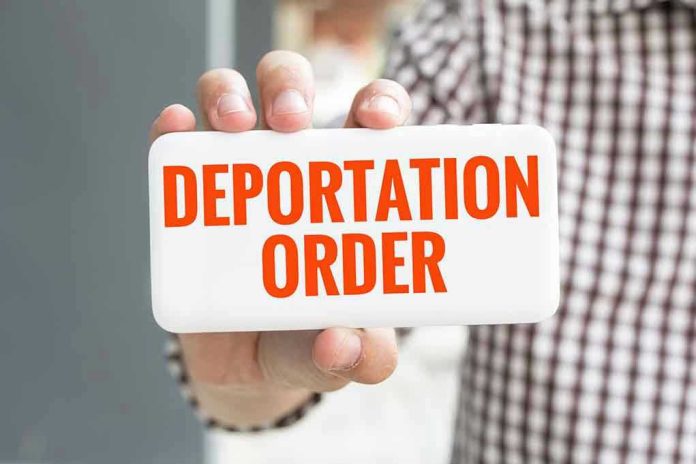
America’s immigration system is being overhauled in real time, as President Trump’s aggressive new measures test the limits of executive power and deliver on promises to clamp down on illegal entry and restore rule of law.
Story Snapshot
- The Trump administration is executing the largest deportation and border enforcement campaign in U.S. history.
- New laws and executive orders expand expedited removals, deputize local police, and deploy military assets to secure the border.
- Humanitarian and legal relief programs are curtailed, affecting Dreamers, TPS holders, and asylum seekers.
- Massive funding increases fuel expanded detention, enforcement, and prosecution of immigration offenses.
Trump Administration Delivers on Promise to Reshape Immigration Policy
President Trump’s second term began with a sweeping series of executive actions and legislative support designed to reverse years of unchecked immigration and restore enforcement as the top national priority.
The White House moved decisively, directing federal agencies to eliminate barriers to repatriation, pressure foreign states for cooperation, and close loopholes left open by previous administrations. These efforts marked a clear departure from the so-called “sanctuary” approach that frustrated many Americans concerned about border chaos and constitutional erosion.
Among the administration’s most dramatic steps is the nationwide expansion of expedited removal. Federal law enforcement can now summarily deport noncitizens apprehended anywhere in the country who lack proof of continuous U.S. presence for two years.
This move, previously limited to border zones, grants immigration officers broad authority to remove individuals without lengthy court proceedings, curtailing what many conservatives viewed as a system riddled with endless delays, appeals, and activist interference. Critics claim this undermines due process, but supporters argue it finally gives teeth to laws long ignored.
Border Security: Military Deployment and Local Police Cooperation
New executive orders direct the use of U.S. armed forces to “seal the borders” and protect American sovereignty from unlawful mass migration. The administration has deployed military personnel and hardware to the southern border, using advanced technology and infrastructure to prevent illegal crossings.
State and local police have been deputized to act as immigration officers, maximizing enforcement reach and cutting off federal funding to jurisdictions that refuse to cooperate. These measures end the era of sanctuary cities and send a clear message that the rule of law will be enforced at every level.
Detention capacity has expanded dramatically, supported by billions in new federal funding. The Department of Homeland Security has received an immediate $45 billion boost for adult and family detention, while private prison companies stand to benefit from the growing need for secure facilities.
The administration’s “One Big Beautiful Bill Act” quadruples the annual detention budget, reflecting the seriousness of the effort to end catch-and-release policies and restore deterrence at the border and beyond.
Humanitarian Relief and Legal Protections Sharply Restricted
Longstanding humanitarian programs have been scaled back or eliminated under current reforms. The administration has ended parole programs for nationals from several countries and canceled Temporary Protected Status (TPS) extensions for more than 300,000 Venezuelans, exposing them to deportation. Protections for Dreamers and other relief categories are being phased out, with Congress urged to repeal all TPS designations.
Stringent new requirements and fees have been introduced for asylum seekers, while “safe mobility” offices abroad have been closed, effectively limiting avenues for legal migration and relief.
Legal immigration has also come under tighter scrutiny. The administration reinstated restrictions from its first term, cutting access to health and nutrition benefits for many lawfully present immigrants. The Child Tax Credit is no longer available to millions of U.S. citizen children with an immigrant parent.
These changes reflect a broader effort to prioritize American citizens in federal programs, reduce incentives for illegal entry, and address concerns about overburdened social support systems.
Massive Funding and Enforcement Expansion Targets All Levels of Illegal Entry
Congress has allocated $170 billion for enforcement, detention, and deportation through new legislation. Of that, $32 billion is dedicated to expanding the ranks and reach of federal immigration agents, while $3.3 billion funds the Department of Justice’s prosecution of immigration offenses.
The administration’s policies now allow for workplace raids, school and hospital enforcement, and the prosecution of individuals for status-related offenses. E-Verify requirements have been expanded, and state and local agencies are incentivized to participate in federal actions.
While critics decry these measures as harsh, the administration insists they are necessary to restore order, protect American jobs, and uphold the Constitution.
Despite pushback from advocacy groups and ongoing legal challenges, the administration’s aggressive posture has energized supporters who see these changes as overdue corrections to years of neglect.
By insisting on enforcement, limiting incentives for illegal entry, and investing heavily in security, President Trump’s government has delivered on a central campaign promise: to put Americans first, defend the nation’s borders, and restore faith in the rule of law.
Limited data is available on the long-term societal impact, but the scope and speed of these reforms are already reshaping America’s immigration landscape.
Sources:
The Trump Administration’s 2025 Changes to Immigration Law
Project 2025: What’s At Stake for Immigrants’ Rights
Ten Harmful Trump Administration Immigration and Refugee Policies
The Anti-Immigrant Policies in Trump’s Final “Big Beautiful Bill …
Protecting The American People Against Invasion – The White House
The Trump Administration Moves to Reinstate Restrictions on Legal …
100 days of immigration under the second Trump administration











